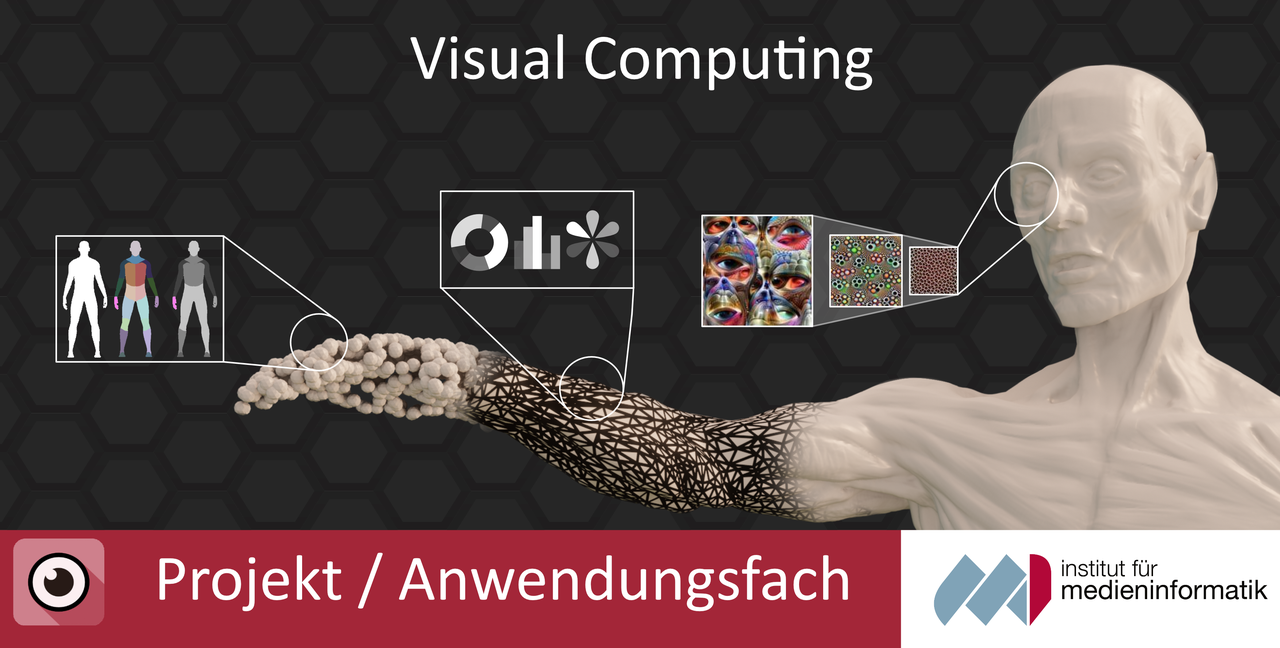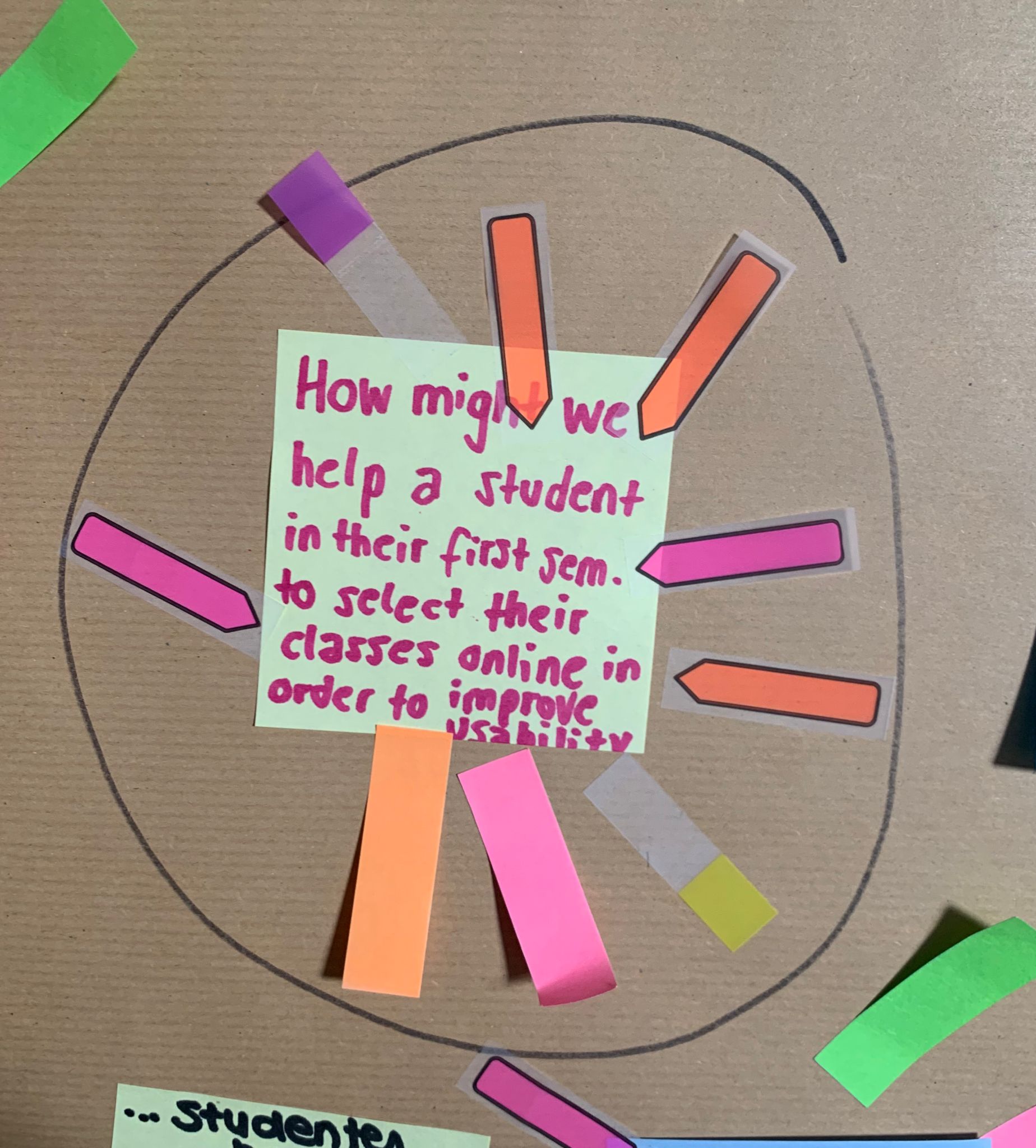Media Informatics
M.Sc.
(FSPO 2022)
tbc (8LP)
75436/15436 (16 ECTS)
(FSPO 2014/21)
Appl. Subj. MI (as DL4GV, 12 ECTS)
75189/15189
Artificial Intelligence
Cognitive Systems
Computer Science
M.Sc.
tbc (8LP)
75436/15436 (16 ECTS)
The following courses may be studied and included as projects in several study programmes and versions of examination rules.
Please be aware while registering for an exam that you can choose from mostly similarly named modules of eight, twelve, or sixteen ECTS. Please also clarify with your supervisor at the start of the project how many hours the lenght of your project has to be designed for.
Media Informatics
M.Sc.
(FSPO 2022)
tbc (8LP)
75436/15436 (16 ECTS)
(FSPO 2014/21)
Appl. Subj. MI (as DL4GV, 12 ECTS)
75189/15189
Artificial Intelligence
Cognitive Systems
Computer Science
M.Sc.
tbc (8LP)
75436/15436 (16 ECTS)
The project is supposed to deepen subject specific knowledge in the area of artificial intelligence, deep learning, and computer graphics.
The project encompass all stages of project work - from the inital stage of problem definition, the framing of possible solutions, up to the technical implementation - in the context of deep learning in computer graphics and visualisation.
We assume a fundamental interest in the topic. It is advisable to attend the lecture course '3D Deep Learning'' beforehand.
To become familiar with some implementations and project results, please take a look at:

Media Informatics
Computer Science
M.Sc.
Software Engineering
M.Sc.
The course provides an opportunity and a framework to conceptualise, develop, and implement solutions to research problems in the field of data visualisation.
To become familiar with some implementations and project results, please take a look at:

Media Informatics
M.Sc.
Computer Science
M.Sc.
Software Engineering
M.Sc.
All modul and exam numbers are currently under revision (3/2023).
Students are able to plan, implement and evaluate a project-oriented scientific work in the field of human-computer interaction in detail on the basis of the design thinking process.
Design Thinking is oriented along the following steps: Empathize, Define, Ideate, Prototype, Test
Zur Information über Anwendungsbeispiele können Sie sich an
orientieren.
Forschungsbezogene Themen werden in jedem Semester aktuell in der Veranstaltungsankündigung vorgestellt und erläutert.

Media Informatics
B.Sc.
Media Informatics
Computer Science
M.Sc.
Module and exam numbers currently under revision (3/2023).
Possibly register under 'Computergraphic':
74619/14621 (8LPO)
74639/14639 (12LP)
74618/14690 (16LP)
In this project, specialist knowledge is deepened through independent work with scientific methods and findings in the field of interactive computer graphics.
To become familiar with some implementations and project results, please take a look at:

Media Informatics
(B.Sc.)
742 43/142 43
Basic types of examples will be presented during the initial meeting.
A portfolio of project results - not only in the scope of this applied subject - is presented in the rubric Streiflicht (raking light), a competition which sheds light on successful and colorful projects in the area of media informatics each year.
The students will first get to know the fundamentals and methods of information and data visualisation from the point of view of information design. We focus on the grafic processing of komplex topics, situations, and facts such that they can be effortlessly understood or interpreted in a short time. The creative and interactive visualisation can be based on the recording and analysis of simply gathered or complex available information. We also take care as to avoid forgery, abuse, and manipulation and will obtain processoral tools as to check for these issues.
The students will broaden and deepen their designs skills, based on the lecture course Grundlagen der Gestaltung I+II, throughout small exercises and short projects. They will learn to use analogue and digital tools to frame simple and aup to complex interactive visualisations in small teams. Finally, these teams will design, implement, present, and document an executable interactive prototype.
The students will have acquired the following knowledge:
Media Informatics
(B.Sc.)
Software Engineering
(B.Sc. old)
708 38/126 87
708 38/126 88
The students are apt to plan and carry out project oriented work to develop interactive systems. They are familiar with theory and practice about interactive systems as well was with methods to design and implement user interfaces of interactive systems. The students are also put into position to present and document their project results convincingly.
During the first semester, we will give a quick overview of the state of the art of User Centered Design and IxD Patterns. We will introduce topics with direct reference to redesign projects. The students will prepare short presentations to explore and discuss subject related questions and techniques and thus prepare a common ground to the project work in the second semester.
The part Interactive Systems II (summer term) consists of a groupwise carried out project conceptualising and prototypically implementing interaction concepts.
The course is conceived as a problem centered project course which strongly relies on cooperative student teams.
Basic types of examples will be presented during the initial meeting.
Fields of applications will be sorted out during the first stage of the project. Goals typically are:
A portfolio of project results - not only in the scope of this applied subject - is presented in the rubric Streiflicht (raking light), a competition which sheds light on successful and colorful projects in the area of media informatics each year.
Media Informatics
B.Sc. MI or
M.Sc. (old)
718 77/128 49
718 77/130 84
Software Engineering
Project of Application
B.Sc. SE
718 77/128 49
718 77/130 84
This course serves as a framework to carry out comprehensive projects linked to research topics of human computer inter-action. They are to be theoretically substantiated, well planed, carried out in small teams of students, and finally documented and presented - empiricl research at its best.
You may get a first impression from visiting the current and concluded research projects of the research group human computer interaction. Typical areas of research are:
A portfolio of project results - not only in the scope of this applied subject - is presented in the rubric Streiflicht (raking light), a competition which sheds light on successful and colorful projects in the area of media informatics each year.
Media Informatics
(B.Sc.; M.Sc. (old exam. rules))
Applied Subject/Project (12 ETCS)
M.Sc. (new)
Project (4+4, or 4+4+8)
CSE
(M.Sc.)
Compulsory Elective Computer Science
75077/15077 (Part 1)
75078/15078 (Part 2)
annexed module/exam number for MI-M.Sc. follow (March 2024)
The course aims at introducing the variety of techniques and tools which allow for autonomously developing hardware centred prototypes of interactive systems. The acquired knowledge will then be used to carry out a topic-related project, leading to practical experiences in the fields of hardware related development as well as project management skills.
You may get a first impression from visiting the current and concluded research projects of the research group human computer interaction.
A portfolio of project results - not only in the scope of this applied subject - is presented in the rubric Streiflicht (raking light), a competition which sheds light on successful and colorful projects in the area of media informatics each year.
Artificial Intelligence
Computer Science
Media Informatics
(M.Sc.)
Software Engineering
(M.Sc.)
This project course is intended to learn and undergo the entire process of design thinking. In particular, it is about the development and enhancement of first-in-class interaction techniques. The goal consists of creating and evaluating a prototypical system.
To get a first impression what this project and its topics are about, please take a look at the list of ongoing and completed research projects of the research group human-computer interaction.
Topics on offer will be introduced and illustrated at a kick off meeting at the beginning of the first semester.